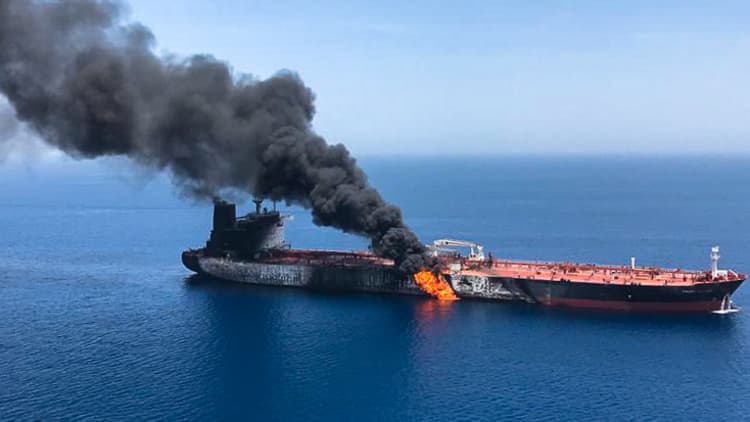Analysts have played down fears of a huge spike in oil prices this year, citing the economic slowdown and trade war — but rising tensions in the Middle East could be a threat to the energy markets, according to a U.S.-based think tank.
Oil prices rose as much as 4% on Thursday following attacks on two tanker ships off the coast of Iran, which the Trump administration has blamed on Tehran.
The attacks in the Gulf of Oman, which involved Japanese and Norwegian vessels, renewed fears of conflict in the Middle East after a series of strikes on oil tankers last month. It occurred near the Strait of Hormuz which is one of the world's most vital sea lanes for oil shipments.
Such incidents "can lead to immediate price rises" in oil, said Anthony Cordesman of the Center for Strategic and International Studies in a note.
Iran also does not have to launch a major war. It can conduct sporadic, low-level attacks that do not necessarily provoke a major U.S. or Arab reaction, but create sudden risk premiums in petroleum prices.Anthony CordesmanCenter for Strategic and International Studies
Iran's growing presence
Tensions between the U.S. and Iran are already high after the Trump administration withdrew from an international nuclear pact with Tehran in May last year. The Islamic Republic has repeatedly threatened to block traffic in the Strait of Hormuz in retaliation for U.S. sanctions on Iran.
Iran can use its naval, air or missile forces to attack ships anywhere in the Gulf, or use proxies to do so, said Cordesman.
"Iran also does not have to launch a major war. It can conduct sporadic, low-level attacks that do not necessarily provoke a major U.S. or Arab reaction, but create sudden risk premiums in petroleum prices," he wrote.
Those attacks can be carried out by ships without Iranian flags, or operators not wearing Iranian uniforms, "that cannot be directly tied to actions by the Iranian government," Cordesman said.
Furthermore, he pointed to the growing Iranian naval presence in the Gulf of Oman and the Gulf of Aden near Yemen, ostensibly to prevent smuggling and deal with Somali pirates.
Limited route options
In addition, there are "limited options" to bypass the Strait of Hormuz, which is the world's most important choke point for oil shipments, Cordesman wrote.
The U.S. Energy Information Administration estimated a record 18.5 million barrels per day of sea-borne oil passed through the waterway in 2016, and it accounted for a third of such sea-borne traded oil and other liquids in 2015.
Most of the crude exported from Saudi Arabia, Iran, the United Arab Emirates (UAE), Kuwait and Iraq passes through the strait, which lies between the Persian Gulf and the Gulf of Oman. The UAE and Saudi Arabia have sought to find alternatives to bypass the strait.
But existing alternatives are limited, said Cordesman.
"The only options to this traffic by sea are a limited pipeline through Iraq to a port in Turkey that offers little real-world surplus capacity," he said.
There is another bigger pipeline through Saudi Arabia to a port at Yanbu on the Red Sea, but "even in a best case, this amounts to less than 20% of the petroleum that now flows daily out of the Gulf," he wrote.
Furthermore, such alternatives are also subjected to risk, Cordesman pointed out, citing that Saudi Arabia shut down the Yanbu pipeline after an attack by armed drones in May this year.
Only Saudi Arabia and the UAE have pipelines that can ship crude outside the Persian Gulf and still have additional pipeline capacity to circumvent the Strait of Hormuz, he indicated. Even so, the total capacity from both countries was only 6.6 million barrels per day at the end of 2016.
— Reuters contributed to this report.
WATCH: Two tankers on fire after attack in Gulf of Oman



